What I Learned In Culinary School, Part 3
In my “What I Learned in Culinary School” series, I’ll be sharing tips and tricks that I learned from two years of working with some of the country’s best chefs. This will include big things like learning to work efficiently, and small things like how to cook bacon perfectly. All of them will be applicable to your home kitchen, making you a faster, better, and more confident cook.
I’m back with the final installment of “What I Learned In Culinary School” (check out Part 1 and Part 2 if you missed them!). Since I’ve already had a long day in the kitchen doing recipe testing, I’ll just go ahead and jump right into it. While this is the last installment of this list, I will be back in the future with some specific things I learned (ones that pertain more to a certain recipe or technique rather than general kitchen tips).
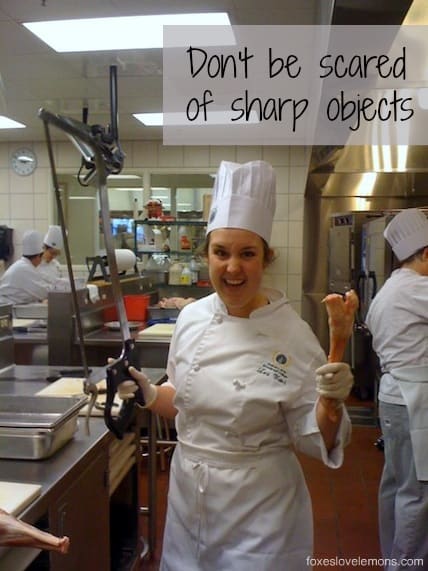
I know a lot of people are scared of cutting themselves in the kitchen. Sure, I’ve nicked myself a few times, and once even had to get some stitches for a more serious cut. But those times where I hurt myself can be blamed on one of two things (or both): a dull knife, and not paying attention. You’re probably about 500 times more likely to cut yourself with a dull knife than a sharp one. Why? Because with a dull knife, you have to exert more pressure to try to cut whatever it is you are cutting. More pressure means there’s more chance the knife will slip, and hit your fingers instead. A razor-sharp blade will just glide through the food you’re chopping, and you’ll be safe. Also, don’t try to look up at the clock or see if your pasta water is boiling when you’re cutting things. Just stop the knife and take a look instead. Especially if you’re using a hacksaw to cut a leg of lamb in half. You know, if you do that at home.
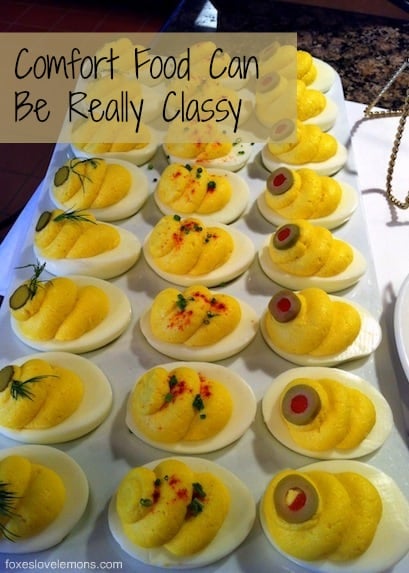
Look, I LOVE comfort food. But sometimes, it just doesn’t feel fancy enough to take to a party or make for a special occasion. But you know what? No matter what it is, you can probably make it look fancy and still taste just as delicious. Envision your favorite comfort food classic, and then think about little tweaks you can make to class it up. Meatloaf? Maybe try baking it in small muffin tins, so each person would get a cute individual serving instead of one ugly loaf. Macaroni and cheese? Add something special, like roasted red peppers or even lobster. Go to the fancy cheese counter at the store and ask for a nice melting cheese instead of just using good old Kraft. And just look at those deviled eggs. All it took was 10 minutes and a piping bag, and they look like something you would eat at a fancy cocktail party rather than a casual potluck.
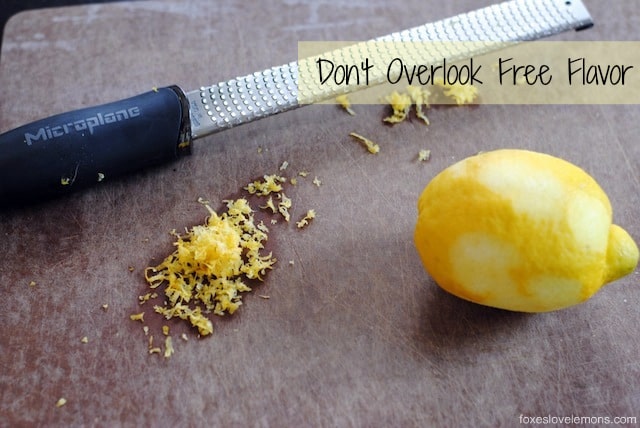
This is one of my favorite tips. Zesting a lemon, lime, or orange before you juice it, and then using that zest in whatever dish you’re using the juice in is a great everyday tip, and may seem obvious. But the light bulb really went off for me when I was in school, and I was making a risotto that was going to be topped with sauteed shrimp. We were using fresh shrimp, shell on/tail on. So, we were obviously going to have to peel the shrimp before cooking them. The chef saw a classmate and I tossing the shells in the trash, and he came running over screaming “NONONONONONONO NO!” He told us we were throwing away free flavor. Instead of pitching those shells, he dumped them all in the pot of vegetable stock that was heating on the stove, and that we were going to be using to make our risotto. Now we just had to simmer it awhile and then pass it through a strainer, and we had shrimp stock, which was even better than what we started with. And it cost nothing!
Save This Recipe!
So now, when I’m in my home kitchen and I’m about to throw something away, I take a moment to see if there’s some other way I can eek some free flavor out of it. It’s a great strategy for almost all seafood shells and meat bones. Veggie trimmings can also be saved to make a free homemade vegetable stock. And always always always zest your lemons. Just as a favor to me. Even if you’re not going to use the zest right away, it freezes really well!
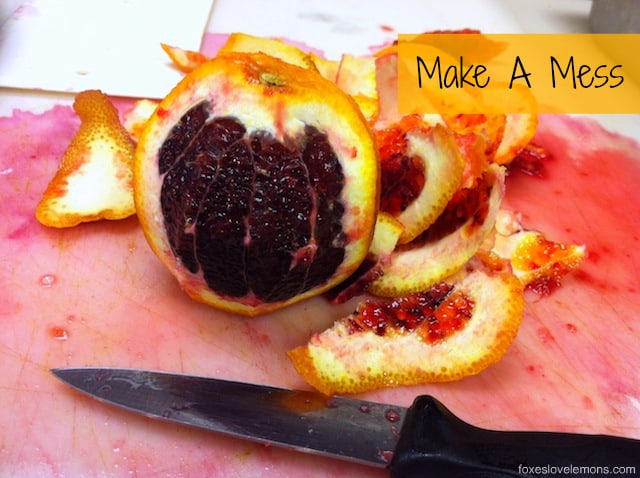
Don’t be afraid to get your kitchen dirty. It can always be cleaned. Kitchens aren’t meant to be showplaces unless you live in a model home (which makes me think of Arrested Development. But even the Bluth family used the Cornballer once in awhile). Kitchens are meant to be used. Even if you’re butchering a blood orange while humming the Dexter theme song. But if you’re making a mess…
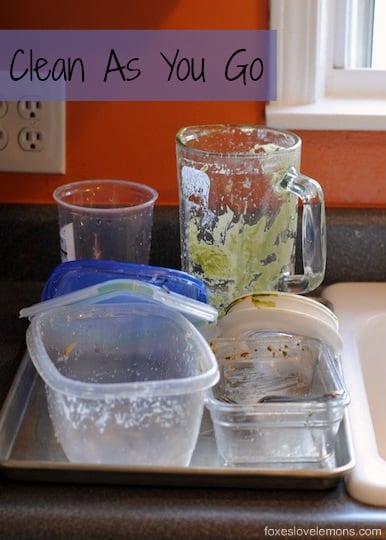
You’ll save yourself a lot of stress if you learn to constantly clean up after yourself. Once you get the hang of it, it becomes habit. We were never allowed to have messy stations at school, so we were constantly running dishes to the dishwasher. We also always kept a wet rag nearby to wipe down our stations. Constantly. While I take a little more lax approach at home, one trick I do like is to grab a baking sheet and keep it near you while you’re doing prep work and cooking. As you dirty up dishes and utensils, put them on the baking sheet. Instead of running back and forth to the sink, you’ll have everything corralled on that baking sheet, and you can just make ONE trip to the sink.
My rule is that as soon as that baking sheet is full, I must stop what I’m doing and do some dishes. Sometimes I don’t want to, but I always make myself do it, because I know it’ll mean that when I’m done eating the delicious meal I’ve prepared, there won’t be a mountain of dishes waiting for me. Maybe just a few. And that’s a lot more tolerable than a full-on mountain.
For more tips and tricks from my school days, be sure to check out my culinary school archive.


I like to clean up as I go, at least partially. You must have a huge kitchen if you take a trip to the sink from where you are working. After 50+ years of cooking, I am finally starting to get the sharp knife thing. Better late than never, I guess?
Oh no, Susan – I have FAR from a huge kitchen. I have a teeny tiny postage-stamp sized kitchen! But I guess corralling all of the dirty dishes onto a sheet pan still just works for me. Even though it’s only 3 steps to the sink, it’s 3 steps that I only have to take once, I guess. Every little bit helps when you’re in the kitchen as much as I am 🙂
I understand, Lori. With clean up you learn how to do what works for you. That’s a lesson I learned a long time ago. From reading your posts on culinary school, it sounds somewhat akin to medical school (no I haven’t been to med school), but fortunately of shorter duration.
Well, it was pretty exhausting, but I’m sure it was nowhere near as hard (or important!) as medical school. If I have a bad day, nobody dies. The worst that could happen is a steak gets over-cooked or something. haha 😉
Thanks Nancy! I’ll definitely keep it going with the tips and tricks. I’ve got two years worth of school to write about 🙂
Yep, it takes some “practice” to get in the habit of cleaning as you go. Also – I’m lucky enough to have a dishwasher, which really helps. I put just about everything possible in there, except knives 🙂
Lori, I’ve really loved this series and hope you keep up with all your culinary school tips, tricks and stories. I took a knife skills class last year and the instructor said the same thing to us about dull versus sharp knives cutting us more often. My knife skills suck but I DID finally pick up some good knives to use at home. And amen to keeping bones ‘n shells for stock – I do it all the time. I’ve never thought of freezing citrus zest so thanks for sharing that! A big sigh about keeping my kitchen clean – I always make a huge mess when I cook and bake! My mom is amazing at constantly cleaning and doing dishes while she cooks. Me, not so much. I’m a work in progress!
Lori, I’ve really loved this series and hope you keep up with all your culinary school tips, tricks and stories. I took a knife skills class last year and the instructor said the same thing to us about dull versus sharp knives cutting us more often. My knife skills suck but I DID finally pick up some good knives to use at home. And amen to keeping bones ‘n shells for stock – I do it all the time. I’ve never thought of freezing citrus zest so thanks for sharing that! A big sigh about keeping my kitchen clean – I always make a huge mess when I cook and bake! My mom is amazing at constantly cleaning and doing dishes while she cooks. Me, not so much. I’m a work in progress!
Thanks Nancy! I’ll definitely keep it going with the tips and tricks. I’ve got two years worth of school to write about 🙂
Yep, it takes some “practice” to get in the habit of cleaning as you go. Also – I’m lucky enough to have a dishwasher, which really helps. I put just about everything possible in there, except knives 🙂
I’m going there tomorrow for pickles for my memorial day BBQ, I feel so bad for her. She is wonderful and her pickled beets are the best.
Oh, that is too bad about the pickle lady! Those small business are so important to hold on to, but it’s also so hard for them to stay in business. If I lived near her store, I’d buy a couple pounds of pickled beets every week 🙂
We are trying desperately to hang on to the Mom and Pop businesses. McClure pickles are huge, they sell at the Brooklyn Flea and they can be found in just about any store around here. They are great pickles. I love the pickle lady but unfortunately she is having a very hard time making a go of her business and sadly may be closing shop. I need the grinding truck badly, my chefs knife is getting really dull, I hope he comes again soon.
Wow, I’d be in love with both of those businesses if I lived in Brooklyn! When I knew I needed my knives sharpened beyond what I could do at home, I tried to find a small mom-and-pop shop that has services like that here in Detroit. But, I didn’t find any. I think it’s pretty rare anymore, which is sad. I ended up just having to take them to Sur La Table, and they did…just an OK job. Nothing spectacular.
Speaking of pickles, are McClures big in Brooklyn? They’re huge here in Detroit – the brothers that own the company both grew up here. Now, one lives in Brooklyn and the label says “Detroit-Brooklyn”. Just wondering if they’re actually big there or not.